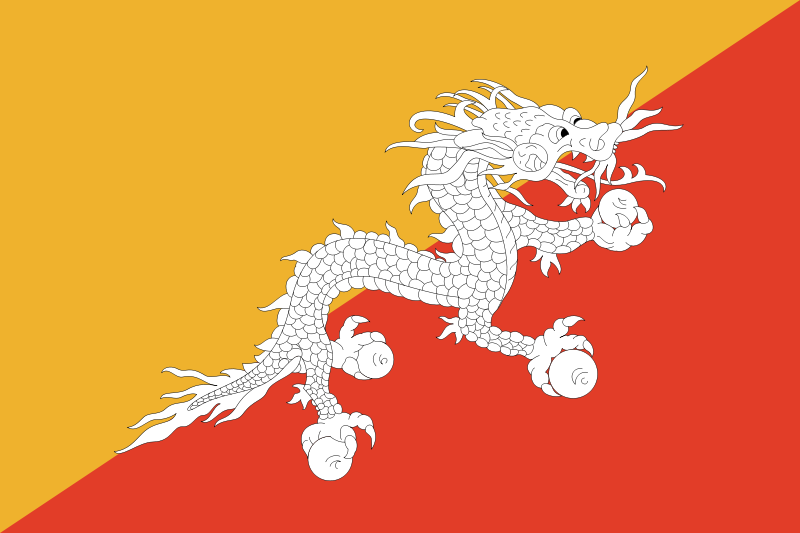
 | Society |
| Society was traditionally divided into the zhung (monarchy and bureaucracy), dratshang (religious community), and misey (people) without a caste system. During the medieval period, when a loose form of feudalism prevailed, people working for the kings and lords in different dzongs (forts) were categorized by their professions. But the division was not rigid since anyone could rise to the highest position. All people were taxpayers. | |
 | Ethnic Groups |
| There are three main ethnic groups. Sharchop largely live in eastern Bhutan and the Ngalop of western Bhutan were people of Tibetan descent who immigrated as early as the fifth century. People of Nepalese origin settled in the south of the country toward the end of the nineteenth century. However, the ethnic division is becoming blurred with increasing intermarriage, migration, and settlements. | |
 | Food |
 Staple diet is red rice, buckwheat, wheat, maize, pork, beef, chicken, yak meat, cheese and chilies, which are taken as vegetable and not as spice. Staple diet is red rice, buckwheat, wheat, maize, pork, beef, chicken, yak meat, cheese and chilies, which are taken as vegetable and not as spice. | |
 | Government |
 In 1998, His Majesty devolved executive powers to the council of ministers that was elected by the chimis (Members of Parliament) of National Assembly (parliament). Different constituencies consisting of one or more gewogs in turn elect the chimis. The king is now the head of the state.The government is elected by the parliament for a five-year term, with the head of the government or post of prime ministers rotating amongst the five ministers securing maximum votes. At district level, Dzongda functions as the chief executive officer, and the gup (head man) elected by the people is the chief executive officer at gewog level. Under the policy of greater decentralization and empowerment of the people, the Dzongkhag Yargay Tshogdu and the Geog Yargye Tshogchung have been given full administrative, policy making and financial powers in their respective Dzongkhags. Therefore, the success of development programmes will now be determined by the decisions taken by the people and the quality of their participation in implementing them. In 1998, His Majesty devolved executive powers to the council of ministers that was elected by the chimis (Members of Parliament) of National Assembly (parliament). Different constituencies consisting of one or more gewogs in turn elect the chimis. The king is now the head of the state.The government is elected by the parliament for a five-year term, with the head of the government or post of prime ministers rotating amongst the five ministers securing maximum votes. At district level, Dzongda functions as the chief executive officer, and the gup (head man) elected by the people is the chief executive officer at gewog level. Under the policy of greater decentralization and empowerment of the people, the Dzongkhag Yargay Tshogdu and the Geog Yargye Tshogchung have been given full administrative, policy making and financial powers in their respective Dzongkhags. Therefore, the success of development programmes will now be determined by the decisions taken by the people and the quality of their participation in implementing them. | |
 | Politics |
The establishment of monarchy is the watershed event in the history of modern Bhutan. The country enjoyed peace and progress under successive reformist monarchs. The third king, His Majesty Jigme Dorji Wangchuck reformed the old psedo-feudal systems by abolishing serfdom, redistributing land, and reforming taxation. He also introduced many executive, legislative, and judiciary reforms. The fourth and present king, His Majesty Jigme Singye Wangchuck, took decentralization to the people, and devolved all executive powers to a council of ministers elected by the people in 1998, besides introducing a system of voting no confidence in the king, which empowered the parliament to remove the monarch. The national Constitution Committee started drafting of the Constitution of the Kingdom of Bhutan in 2001 has been presented to the Lhengye Zhungtshog (Cabinet). The Draft Constitution will be distributed to the people in 2005, which would be followed by public consultation. Its implementation will establish parliamentary democracy in the country. The fourth and present king, His Majesty Jigme Singye Wangchuck, took decentralization to the people, and devolved all executive powers to a council of ministers elected by the people in 1998, besides introducing a system of voting no confidence in the king, which empowered the parliament to remove the monarch. The national Constitution Committee started drafting of the Constitution of the Kingdom of Bhutan in 2001 has been presented to the Lhengye Zhungtshog (Cabinet). The Draft Constitution will be distributed to the people in 2005, which would be followed by public consultation. Its implementation will establish parliamentary democracy in the country. | |
 | Administrative Division |
| The country is divided into twenty administrative units called dzongkhag. The larger dzongkhags are further divided into sub-district called dungkhag. A group of villages are grouped to form a constituency called gewog and administered by gup who is also elected by the people. Judiciary: His Majesty the King is the final court of appeal. The Royal High Court is the apex of the judiciary system. It is supported by district court in all 20 dzongkhags. There are sub-district courts called dungthrim in larger dzongkhags. At villages the gup and chimis settle petty disputes. | |
 | Religion |
 Drukpa Kagyue school of Mahayana Buddhism is the state religion. Hindu is the dominant faith in the South. Some residues of Bon, animism and shamanism still exist in some pockets of the country. Drukpa Kagyue school of Mahayana Buddhism is the state religion. Hindu is the dominant faith in the South. Some residues of Bon, animism and shamanism still exist in some pockets of the country. | |
 | Foreign Relation |
| In 2004, Bhutan has a diplomatic relations with 22 countries (including EU), with resident ambassadors in India, Bangladesh, Bangkok, Kuwait and two UN mission offices in New York and Geneva. It has Honorary Consels in 10 countries. It is a member of 45 international organizations. Only India and Bangladesh have residential embassies in Bhutan. | |
 | Foreign Trade |
| In 2002, Bhutan total export is worth 5,261.8 million, and Nu. 8,023.7 million import, recording a trade deficit of Nu. 2761.9 million. India continues to be the main trading partner (Nu. 4,919.1 million) followed by Bangladesh (22.7 million) and 120.o million from other countries. Electricity, products of chemicals, metal, wood and processed food, mineral products, textiles, stones, cement and asbestos products are the main export items. Bhutan’s import items are fuel, cereals, motor vehicles, machinery and mechanical appliances, metal products, plastic and rubber products. The major importing countries are India (75%), Japan (4%), United Kingdom (4%), Singapore (3%) and Thailand (3%) and 11% from other countries. are. Sale of electricity constitutes 43.7% of the total exports. | |










